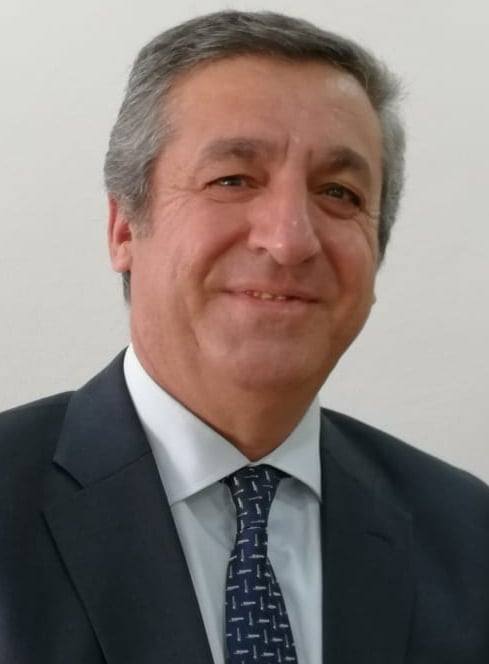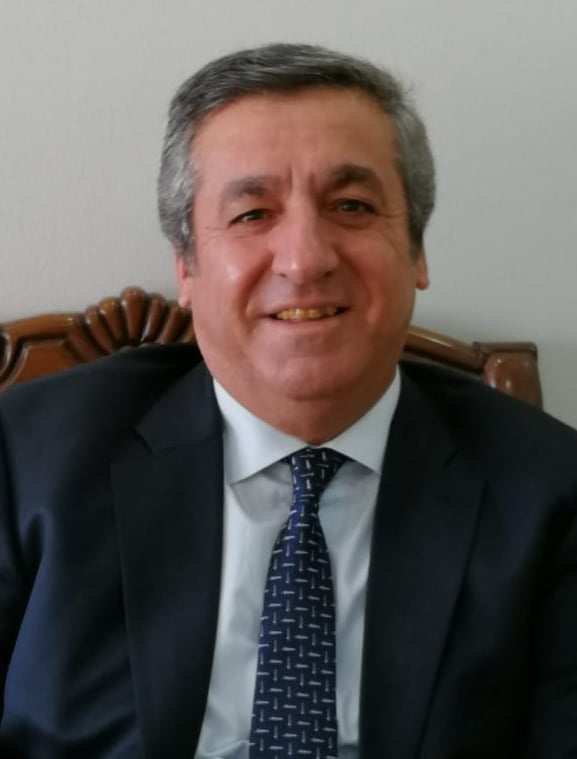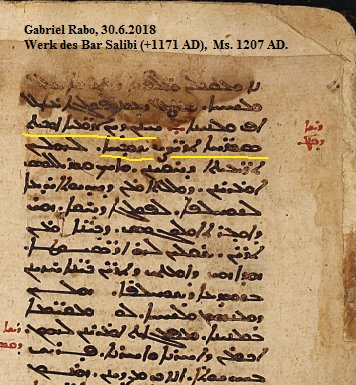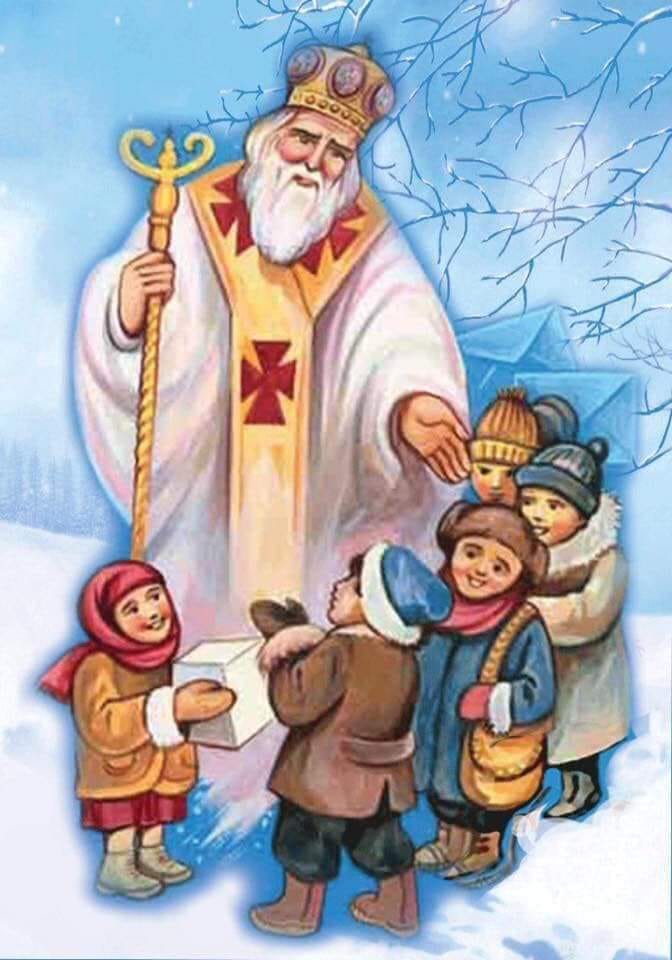مقابلة مع الكاتب سمير روهم 2010
مقابلة مع الكاتب سمير روهم 2010
مقابلة مع الكاتب سمير روهم 2010
مقابلة مع الكاتب سمير روهم 2010
مقابلة مع الكاتب سمير روهم 2010

ܣܰܪ̈ܒܳܢܐ ܘܡܰܚ̈ܒܢܐ ܡܝܰܩܪ̈ܐ ܕܠܫܢܐ ܣܘܪܝܝܐ.
ܘܚܘܒܐ ܘܐܝܩܪܐ ܘܫܠܡܐ ܒܡܪܢ.
ܦܘܼܪܣܐ ܗ̱ܘ ܛܒܐ ܕܢܛܝܒ ܚܢܢ ܠܢ ܕܢܬܝܠܕ ܡܫܝܼܚܐ: ܡܰܟܝܼܟܐ ܘܫܰܦܝܼܪܳܐ ܘܢܰܗܝܪܳܐ ܒܰܡܥܰܪܬܐ ܕܚܘ̈ܫܳܒܝܢ ܘܫܰܪܟܐ ܕܕܘܼܒܳܪ̈ܝܢ ܘܗܘܼܦ̈ܟܝܢ ܠܰܡܬܰܪܣܳܝܘܼܬܢ ܒܣܘܼ̈ܟܠܐ ܡܬܒܰܥ̈ܝܢܐ ܕܒܪܢܫܐ ܚܕܬܐ «ܡܘܠܕܐ ܬܪܝܢܐ» ܗܢܐ ܕܡܛܠܬܗ ܡܰܟ ܘܰܢܚܶܬ ܠܐܘܪܝܐ ܕܒܝܬܠܚܝܡ.
ܣܓܝ ܒܰܣܝܼܡ ܘܰܚܠܐ ܕܘܟܪܢ ܝܰܠܕܐ ܐܠܗܳܝܐ ܗܳܢܐ ܕܰܟܡܐ ܕܡܬܥܰܦܦ ܝܬܝܪ ܚܳܠܐ ܘܒܳܣܡ ܛܰܥܡܗ. ܘܡܰܪܘܰܚ ܘܰܡܢܝܼܚ ܠܠܒ̈ܘܬܐ ܒܰܫܠܡܐ ܡܩܰܘܝܢܐ ܕܢܘܗܪܗ ܡܰܢܗܪܢܐ. ܘܰܡܨܰܝܒ ܡܰܪܕܝܼܬܐ ܒܣܘ̈ܟܳܠܐ ܡܶܬܒܰܥ̈ܝܢܐ ܕܓܳܡܪܝܼܢ ܘܚܳܣܢܝܼܢ ܘܩܳܒܥܝܼܢ ܒܪܢܫܐ ܒܬܰܪܒܝܼܬܐ ܘܡܰܪܕܘܼܬܐ ܟܢܝܼܟܬܐ ܕܡܳܬܩܐ ܡܠܘ̈ܐܐ ܙܘ̈ܡܳܝܐ ܡܼܢ ܗܶܕܣ̈ܘܗܝ ܡܶܫܬܰܦ̈ܥܳܢܐ ܕܒܗܘܢ ܢܶܣܦܰܩ ܠܢܦܫܗ ܘܠܐܚܪ̈ܢܐ ܚܰܟܝܡܐܝܬ ܘܡܰܠܝܐܝܬ.
ܡܶܟܐ ܒܪ̈ܶܓܫܐ ܕܚܰܕܘܐ ܗܢܐ ܥܘܕ̈ܥܳܕܐ ܘܒܘܼܪ̈ܟܐ ܡܩܰܪܒ ܘܡܰܘܫܛ ܐ̱ܢܐ ܠܟܘܢ ܘܒܰܫܡܟܘܢ ܫܘܳܬ ܠܝܩܪ̈ܬܟܘܢ ܘܠܟܠܗܘܢ ܥܡ̈ܘܠܬܢܐ ܗܿܢܘܢ ܕܫܳܗܪܝܢ ܘܥܳܡܠܝܼܢ ܡܛܠ ܡܐܚܝܳܢܘܼܬܐ ܕܠܫܢܐ ܣܘܼܪܝܝܐ ܘܝܪܬܘܼܬܗ ܢܨܝܚܬܐ. ܘܰܡܦܝܣ ܐ̱ܢܐ ܡܢܗ ܕܢܬܗܕܪܘܢ ܘܢܨܛܒܬܘܢ ܟܠܗܘܢ ܣܕܪ̈ܝܢ ܡܕܝ̈ܢܳܝܐ ܘܐܘܡ̈ܬܢܳܝܐ ܒܠܶܒܐ ܘܗܰܘܢܐ ܫܰܠܡܐ ܘܢܬܬܠܝܫܘܢ ܒܚܡܝܼܪܐ ܡܰܚܡܥܳܢܐ ܕܣܘ̈ܟܳܠܘܗܝ ܒܪܝܪ̈ܐ܆ ܘܢܶܣܬܰܡܣܡ ܟܘܼܪܗܢܐ ܦܪܝܼܣܐ ܘܡܬܝܰܒܠܢܐ ܒܰܥܨ̈ܳܒܐ ܡܩܰܘ̈ܝܢܐ ܘܰܡܢܝܼܚ̈ܢܐ…!
ܒܪܝܼܟ ܝܠܕܗ ܕܡܪܢ. ܘܬܬܒܰܪܟ ܫܢܬܐ ܚܕܰܬܐ 2022 ܒܛܒ̈ܬܐ ܘܒܘܼܪ̈ܟܬܐ ܕܝܰܠܕܐ ܟܕ ܙܳܠܚܐ ܫܝܢܐ ܘܫܠܡܐ ܒܥܳܡܰܪܬܐ ܘܰܒܡܰܕܢܚܐ. ܘܣܳܝܓܐ ܘܢܳܛܪܐ ܠܟܠܢ ܒܚܰܝܠܐ ܡܣܝܼܡܳܢܐ ܘܚܘܼܠܡܢܐ ܛܒܐ ܘܛܢܢܐ ܫܪܝܪܐ ܘܟܘܼܫܳܪܐ ܡܢܰܨܚܢܐ. ܐܝܟܢܐ ܕܟܠܢ ܥܡ ܟܠܢ ܝܬܝܪ ܢܡܬܘܿܩ ܘܝܬܝܪ ܢܐܬܪ… ܡܢ ܫܪܪܐ ܕܢܘܼܗܪܗ ܦܪܝܼܣܐ ܘܚܰܘܣܢܗ ܒܪܝܟܐ: «ܕܡܼܢ ܡܰܠܝܘܼܬܗ ܚܢܢ ܟܠܢ ܢܣܰܒܢ. ܘܛܰܝܒܘܼܬܐ ܚܠܦ ܛܰܝܒܘܼܬܐ» (ܝܘܚܢܢ 1: 16).
ܘܣܟܐ ܠܡܐܡܪ: ܩܰܘܘ ܦܨܝܼܚܝܼܢ ܘܰܚܘܝܼܚܝܼܢ ܘܢܝܼܚܝܼܢ ܘܰܒܗܝܼܠܝܼܢ ܒܚܘܒܐ ܘܰܫܠܰܡܐ ܘܣܰܒܪܐ ܘܫܰܝܢܐ ܕܝܰܠܕܐ ܠܗܶܢܝܢܐ ܕܝܳܪܬܘܼܬܢ ܘܠܝܘܬܪܳܢܐ ܕܗܠܝܢ ܕܝܠܟܘܢ. ܥܡ ܐܝܩܪ̈ܝ ܘܥܘܕ̈ܥܕܝ ܒܪ̈ܝܟܐ.
24 ܟܢܘܢ ܩܕܝܡ 2021 ܡܪܕܝܢ ܡܕܝܢܬ ܥܬܝܩܬܐ ܕܒܝܬܢܗܪܝܢ
ܝܘܣܦ ܒܓܬܫ
ܚܘܼܕܪܐ ܕܡܪܕܘܼܬܐ ܘܣܶܦܪܳܝܘܼܬܐ ܕܠܫܢܐ ܣܘܪܝܝܐ
Kolo d-Yaldo
https://www.youtube.com/watch?v=9dYQHX5PJYE
Yaldo Ma-denhoyo
https://www.facebook.com/watch/?v=624300095384997&extid=CL-UNK-UNK-UNK-AN_GK0T-GK1C&ref=sharing
Yaldo Ma-rboyo
https://www.facebook.com/watch/?v=1024049684741566&extid=CL-UNK-UNK-UNK-AN_GK0T-GK1C&ref=sharing

THE BELS WILL RING FOR A NEW UNDERSTANDING
‘‘What has come into being in him was life, and the life was the light of all people. The light shines in the darkness, and the darkness did not overcome it’’ (John 1: 3-5).
We are very close to a day that blesses the renewal life: Yaldo, Christmas.
We as limited human in understanding, this day is so deep and so a blessed day.
As in our daily life ups and downs, it is a day that helps to open to find the door to our spirit.
This day finds its meaning in the thoughts of St. Afrem (A.D 303-373), “In order none of us to look at the True One, and when sin covered everythinhg, The True One entered in the womb of a lady, and with His birth scattered the sin.”
In this day, “A long day in the eternity, entered in so short day of ours.” St. Augstinous (A.D. 354-430).
This, means the thing so high becoming so low, the greatness becoming nothing.
The lowly in humanity, we are the small one. The greatness belonging to the Lord!
Because of this greatness and because of the Holy Spirit the Lord was manifested into the world. The one who is Great was offered to the low ones.
In order those who are low must live according to the teaching of Christ Jesus, and must speak and do accordingly. His teaching works inside. This is love, and this must be continually growing. This is a way.
Because Jesus Christ does not only pointing the way, the truth and the life. He is himself the way and the truth and the life.
This way, is not fleshly, but is spiritual, is not worldly, but deep spiritual meaning.
In this way a man fully enjoys the light, and enjoys the way of giving more than receiving.
Jesus Christ has come to destroy the old life build on fear, and to give a new way of life build on love. As light effects the darkness, His birth overcomes fear.
It is only possible to overcome fear that comes from selfishness by seeing His light and live in that light.
The thought of the world has surrendered our life as the computer virus, but the light of the birth of Christ is protecting us from wrong, and fears as anti-virus.
This is why the birth of Christ is not an event last for a short time, but it is a daily life effect our way of thinking, it is an event of love. This love is the spirit of life.
This love that gives enerjy to life is a light to EGO, and a key to unlock doors.
Through the birth of Jesus we have got the light and the key. We also had the deep understanding of life. And by knowing this understanding we had the freedom of not to do what we want but to give us the power of what we ought to do. This strengthen the spirit of controling ourselves.
If we want to live in this love and spirit, then we have to open our hearts to this light that comes through the birth of Jesus Christ. We should let the Holy Spirit surrender us. We could do this not by fear, but by love.
All our upside downs comes through our thoughts without love. We should be willing to change this with love.
Jesus Christ explained this fact in this way: “It is not what goes into youe mouth that makes you ritually unclean. Rather what comes out of it make you unclean. The things that come out of the mouth come from the heart, and these are the things that make you unclean. For from your hearts come the evil ideas which lead you to kill, commit adultery, and do other immoral things; to rob, lie, and slander others.” (Matthew 15:10-20)
According to this thought, the mind that comes out of the flesh is not like the mind comes out of love. The fleshly mind thinks only trick, guile and selfishness. The mind that makes love its crown thinks genuine, integrity. Because, “The worst that decieve the soul in mindly decieve.”
We need to focus on ourselves in order to grow. If the people have not focussed on sin, Jesus would not come to the world, there would not be a salvation.
In our day people lost their love and became unmercifull. But through of the Holy Spirit, we can do the impossible things. Because the LIGHT that came to the world is in and live in us.
If we allow Him to do for us that we can not accamblish, He will do for us, He will give us His power.
If that light does not move inside us, it will not be effective in our outworldly life. Through that light move in our inner life, then there will be joy and power in our life.
That light has gifts. If we walk by the Holy Spirit that is according the elight, then there will new things and new ability in our life. If we put our thoughts under His thought then the selfisness that surrender us will disappear.
We have to be aware of our selfisness. If we do anything out of love, this will cause us to leave the Holy Spirit and light.
We should not forget that we are a member of Christ Jesus. If we walk out of the will of that Spirit and light then we will be like a concer in the body of Christ. We will always be spiritual sickness in that body.
In spite of all things we have to follow the thoughts of that Spirit and light. Then we can be helpfull, peace maker, integrative, and supporter to others.
This Christmass that we celebrate, will be continually supporter of transformed life by the light of Jesus Christ.
We with the deep understanding this day, and with the help of our Lord Jesus Christ, we could have a new way of living. We could born in the newness of life.
Because the sign of the Christmass is a star. That star is a light in the darkness. As like this the Christmass –Yaldo- is also a sign of changed life.
If we accept this truth then our life can be a place for Jesus Christ. With this Jesus in our life can have a real life.
If only we let Jesus live in our cave of thinking.
If only as the shepperd feed and protect the flock, we turn our eyes to that star.
That star is faith, hope, love, mercy, goodness, peace and forgiveness.
‘‘I have done my best in the race, I have run the full distance, and I have kept the faith.” (2Timoteos 4:7) We should pay attention to this Christmass, and keep it.
Here is the bells are ringing for this new understanding, and for proclaming the new hope.
I want to share this good news to all of you with all my heart.
‘‘Merry Christmass’’ and Happy New Year!
Respectfully yours.
Yusuf Beğtaş
Syriac Language-Culture and Literature Association / Mardin
Main Source:

“Hanila” in Syriac Culture
Language is the foremost element that forms culture. And faith has an important place among the elements that sustain culture. The combination of these two elements, their synonymy grants a multiplicity of meaning to the word.
Because the semantic wealth of every name or word is directly proportional to the intellectual expressions of the culture which developed or uses it. When viewed from this aspect, it can be said that language, which forms the most essential element of culture, is also a system of nominating and defining.
Because the speakers of a language ascribe meaning to words according to their language and behave according to these meanings. But the incorrect usage of these definitions impedes healthy communication and understanding.
It creates problems in communicating to the other party what one wants. In other words, knowing the correct meaning of words is the only way to communicate accurately both in writing and in speech. Speaking and writing in a language does not equate to knowing that language. The important thing is thinking, producing, and creating an intellectual space in that language.
From a cultural perspective: Hanila
Consequently, the Syriac compound word Hanila was formed out of two different words in order to create an intellectually extensive space and to convey the responsibility of that space. Rooted in sentiments of love, mercy, and help, Hanila’s compassion does not only win over hearts, but also has manifold benefits.
Together with the warm emotions that arise from understanding, there are also sincere sentiments which are gratifying. For example, to open our heart and soul to ourselves and our loved ones, to understand the difficult things in life, to foster sincere feelings toward those in need, toward strangers, and toward all living things are only a few of these emotions.
It is also reflected in abstaining from resentment and hate no matter what. As it has been established through scientific evaluation, “an increase in secretion of serotonin is observed in the brain of compassionate individuals. Serotonin is a hormone secreted by the body that lets us feel more at ease, more peaceful and happier. In other words, good treatment has a positive physical and emotional impact on all involved.”[1]
From the perspective of faith and culture, understanding the context of a concept with profound meanings like Hanila is dependent on the complete knowledge and interpretation of its etymological roots and stages of development.
Without knowing the conditions under which this concept was born and for what purposes it was used, without utilizing the light of philosophy, it is impossible to truly understand it. Therefore, just as it is imperative to study the word Hanila from an etymological perspective as a noun and word before conceptualizing it, it is also necessary to know its context and intellectual disposition in order to be able to say that this noun is Syriac.
Because names/words are the carriers of cultural meanings and context. They reflect a culture’s life perspective, lifestyle, its outlook on the divine system, events, nature, and the universe. A meaning and context that does not exist in a society’s world of thought has neither name nor form. In this context, linguists must be wise as well. Only a wise linguist can grasp the basic nuances of languages.
Whatever an artisan’s set of tools means for him, names and words mean the same for a linguist. When there is no true mastery of a language from a literary and philosophical perspective, the linguistic elements of words, concepts, names, etc. degrade with time or degenerate into mediocrity. These words, when not used in daily speech and writing, lose their impact and become dull. Perhaps this is why the visibility of the name Hanila has been lost and its literary presence faded today.
Divine Compassion
As I pointed out in the example above, just as an artisan keeps the tools he most uses closer to him while working and keeps the ones he uses less farther away, in the same way words are also subjected to function partly in the same way as the artisan uses his tools. With time, the ones closer to the artisan and used more frequently begin to show wear and tear, while the tools farther away begin to rust. Both are possible. However, based on my intuitions, I can say the following from years of experience:
Hanila has a very important and distinguished place in Syriac culture. It is like a globe of heat placed in the center of life. It has forgiving meanings. It envelops all existence. It resides on the top floor of the culture building, in its deep layers. It is a concept that makes it easier to understand the thoughts and feelings of others; and it exists or should exist with its attributes in all areas of life.
From the upper floors and the deep layers, it loudly proclaims the attitudes which can be helpful in understanding and overcoming the hardships of life within the context of causality.
In its attitudes of divine compassion, it advises responsible behavior, it teaches that others also deserve goodness and justice. Thinking of others, wishing their wellbeing, and feeling responsible for them are among its values.
“Hanila” is a noun phrase derived from the Syriac words “han” and “il”, both of which have different meanings.
The word han /ܚܰܢ means merciful one, affectionate one, protector, keeper, guardian.
The word il /ܐܝܠ is identical to the name Allah in Syriac. Allah means God and creator. In other words, this compound word (Hanila) not only contains divine compassion, but also expresses the tenderness and the protecting, preserving, and safeguarding qualities of this compassion, and describes the one who is wrapped up in these qualities and exhibits them in his emotional state and actions.[2]
The word hanono / ܚܰܢܳܢܳܐ has been derived from the same word root. Though this name is attributed primarily to God, it also identifies those who exhibit the emotional intensity and state of action of divine compassion.
The word hnono / ܚܢܳܢܳܐ, which means mercy and denotes an affectionate pity, guardianship, preservation is also of the same root. It also means compassion. It is used of a state of mind/action which indicates a pitying, protecting love, affection, and guardianship.
Hanila is Wisdom
The wider a meaning is given to a word, the richer that language is considered. Moreover, the wealth of meaning in words is accepted as an indication of the profundity of meaning that language has carried from the past as well as its antiquity.
In this context, just like hanila, the words hanono / ܚܰܢܳܢܳܐ and hnono / ܚܢܳܢܳܐ also have a very prominent place among the Syriac nouns with positive meanings.
The scope of denotation in Syriac is very broad and dynamic. Because in this language, the noun has the power to have an impact/inspire and interact. And generally, denotations are made with the expectation of creating the desired effect and interaction with respect to keeping the memory within a word alive, symbolizing, elevating, and reflecting it.[3]
Denotations, which are regarded as very important in terms of a culture’s “importance and unimportance” standards, have distinctive qualities or effects on individuals and society. And for this reason, children are given names inspired by the Syriac meanings explained above, such as “Hanna, Hanno, Hanuno” for boys and “Hanne, Hana, Hanila” for girls.
Hanila is a wisdom. This word, which appeared as the result of a long and tiring effort, can be defined as a notion and lifestyle that expresses the intellectual and faith-based tendencies of Syriac culture.
It is a word shaped by the input of Syriac culture and reached our times from the depths of a history kneaded in the yeast of that input. It issues from the compassionate comprehension of active altruism, which loves humanity, the universe, the environment, nature, the earth, ecological balance, in short, all existence.
It is like a medicine that heals the broken human heart. It equips its owner with the beauties and virtues of humanity. Like a secret power, it plays a leading role in the success and happiness of sincere and consistent intent-speech-action.
If the outside world is the reflection of the things that pass through our heart, to be in possession of Hanila, which renders the frozen/cold world around us as clear/warm, would be a great service both for ourselves and our environment.
With an aspiration to make the world a safe place for all people and living beings, Hanila has a very different outlook on social events and relationships. It has notions that develop different attitudes beyond the “right and wrong” in the methods of dealing with problems and hardships.
From the Perspective of the Ego
For this reason, every sadness experienced in life carries an important lesson. To learn the lesson, rather than focusing on the sadness, one must question why the sadness is being experienced in the first place. For as humans, our longest journey in life is the one we make from our brain/mind to our heart/spirit.
This journey is very tiring and complicated when it is made with an egotistic/carnal attitude. The quickest way of this journey is Hanila. While offering important contributions to humanity in the inner conflict of duality (light and darkness, good and evil, right and wrong) which leads from opposition to consonance during the self-realization process, it accepts the lessons learned from grief, and goes beyond the right or wrong and to what is “true”. It functions as a glue that amplifies social empathy by showing consideration for subjective views and promoting absolute truth.
Hanila is a phenomenon that shapes and rules all virtues. Therefore, it is never ineffective. It always gratifies. Those who have put it on in the true sense do not defile the ground they walk on.
Life would be unbearable if not for its kindness and grace. Life’s burden would become heavier. Since it does not contradict the zeitgeist, it is an antidote to marginalization. The philosophy of “Doing unto others as you would have them do unto you” is the fundamental teaching of Hanila. Cultures and traditions might be varied but this philosophy of Hanila is absolute and unchanging. It is always the same everywhere.
It Does Not Abide Cruelty and Obscenity
If we want a virtue-centered life and a peaceful world, the great values and great meanings of Hanila must take precedence in our lives. Hanila is like a medicine injected from heart to heart and from spirit to spirit that soothes all pain. As is evident from its name, Hanila is of a divine essence, as regards its composition.
It nurtures freedom and individuality, not cruelty and obscenity. The world becomes a better place thanks to the people who carry Hanila like a jewel in their spirit. Their light is a reminder of the possibility of justice, equality, individuality, and freedom. It instills in us the possibility of eradicating evil, if we wanted.
With its stance against the disregard of human dignity and self-esteem, it protects our physical and spiritual health while both uncovering the good within us and restoring our hope in the good inside others. Its values save us from public embarrassment, whereas spite it leaves to the spiteful, ressentiment to the cruel, and evil to the malevolent.
The tumult of our mind and the agitation of our desires subside. In this hiatus, the inner world advances toward transformation and maturation.
Therefore, Hanila is an opportunity not only for the oppressed and wronged, but also for everyone else. It is a secret weapon that makes the world a privileged place for everyone. In the morality of Hanila, the implicit is equally important to the explicit. Those who only pay attention to what’s explicitly stated appreciate only half of the story.
If we value Hanila, and if we wish for its active role in our lives, we must first train our minds to perceive and internalize it. We must save our inner world from the torturous voids and beguiling shadows of the ego/flesh, and we must adapt accordingly. The wishes and desires of Hanila would never torment or cause distress.
In its services and areas of activity, the ego fades away, disappears. Nothing is expected in return. The result is spiritual gratification, not ego trips.
The more Hanila is internalized and felt in the spirit, the more will it soothe the person. And that person will not yield to polarization in social life; that person does not bring distress on himself or others.
If one idles around in the miasma of dusty, moldy cellars, he will encounter recurring fears, growing darkness, and proportionally rising troubles and tolls, whereas the therapeutic air in the upper floors of Hanila will illuminate and relieve the heart, spirit, and mind.
The inhabitants of the upper floors are intimacy, spiritual unity, oneness, understanding, and virtue; to the exclusion of opposition, separation, polarization, pigheadedness, comparison, boasting, pride, prejudice, conditioning, delusion, complexes, visible and invisible differences, commotion, congestion, overcrowding, and incivility.
The longer one remains in the upper floors, wandering them and breathing their clean oxygen, the quicker will the devastating effect of the abovementioned destructive attitudes be cancelled and lost.
When the effect of these life-poisoning, destructive attitudes is cancelled, suffering is thwarted. Distress is avoided. For there is nothing other than peace and stability in the domain of that oneness and unity. Peace and serenity are experienced. The positive energy spreading from the peace and serenity enveloping the inner world opens the door to healthy communication with the other people who are on lower floors.
For someone who views life from the perspective of Hanila, which functions as the secret power of the universe, it is impossible to discriminate between other people, men and women, to categorize life, classify, seduce, misguide, deceive, manipulate, exploit, or otherwise abuse people.
Hanila teaches us to stay true to ourselves, treat people with sincerity, and do to others as we would have them do to us, as we demand the respect we think we deserve from the world and from people. It makes us ask ourselves whether we act out of self-interest or for the greater good when we continually take this approach. It shows us how we should approach the world and people with discernment, not prejudice.
Reacting to Life Proactively Rather Than Reactively
Though it is difficult to get rid of prejudices, when prejudices are approached with Hanila‘s sentiments, invisible barriers are easily overcome. Just as ignorance of the law is unacceptable as an excuse before the judge, unawareness is not an excuse for an expert on the topic of Hanila.
It is truly exciting to analyze the meaning and importance of a word like Hanila, which expresses much in Syriac from a philosophical standpoint. For Hanila is like a tree whose branches stretch to the sky, staying green and bearing fruit all year round. Since its roots are deep and sturdy, its shadow is relaxing and restful.
I wrote this in order to rest and relax in its shadow, and to offer you rest and relaxation as well. My aim was to revive and interpret an ancient word nearly lost and beginning to petrify for the sake of perpetuating and strengthening life. I wanted to contribute to the discovery of the peaceful and stable domain within a person’s inner world, as well as the spirit of Hanila.
For when we grasp the nuances in meaning of Hanila, such as true identity, balance, harmony, decency, etiquette, and good morals, things that mean true freedom, we develop methods of cleansing ourselves from the rust and dirt of the ego.
We learn how to respond to life proactively, rather than reactively. Thus, we contribute to a better vision of life with the sentiment that if one person can do it, everyone can.
For all of this to transpire, our old habits/mindsets must break and fixed judgements/perception must transform. We have to notice, slow down, stop, relax, and partly do the opposite of the things we’ve done up to this point. However, all this must be done with the spirit and love of Hanila.
Both of our worlds are wealthier thanks to Hanila. Let’s not forget, the things we see with our naked eyes are merely the manifestations of invisible beauties. They are the delicious treats of Hanila.
Therefore, we must take custody of these beautfiul manifestations with greater awareness. We must take better nourishment from those delicious treats. We must take nourishment in order for our visible and invisible differences to lead to intimacy, not alienation; unity, not separation.
To be happy there, is this not one of our greatest needs?
Yusuf Beğtaş
Syriac Language-Culture and Literature Association / Mardin
Main Source of Hanila in English
https://www.karyohliso.com/articles/article/6127
Main Source of Hanila in Arabic
https://www.karyohliso.com/articles/article/6130
Sources and Footnotes:
[1] Zülfikar Özkan. Duygusal İletişim, Ankara, Hayat Yayınları, 2015.
[2] Because of conjectures and delusions, assessments in social life are made according to narrow stereotypes and perceptions. Whereas Hanila has harmonizing holistic attitudes and a spirit of unification beyond fixed opinions and stereotypes. Hanila’s sincere spirit is selfless. It serves selflessly. This selflessness coming from a spirit of unification is often misevaluated due to insufficient and deficient readings tied to a lack of personal experience. Because a person who has that sincere/consistent spirit which others do not, has a different insight and motive. According to others, he has changed in heart, spirit, and mind. He is not easy to understand with his sincere intent. This relative situation takes time and patience.
[3] Various compound names have been formed in the Syriac language and culture using the word “il” in order to draw attention to Divine meanings/qualities. This situation, a manifestation of commitment to the divine system, is a different interpretation of giving meaning to the flow and the current time, of confronting problems/difficulties. I believe listing some of these names will be beneficial in clarifying the matter. Here are some of these obscure names awaiting their demise:
Hadil (divine unity), Ahil (divine brother), Habil/Yabil/Yabila (divine gift), Gazil (divine treasure), Zenil (divine weapon), Zahril (divine beam), Tobil (divine goodness), Tebil (divine news), Kinil (divine justice), Moril/Maril (divine master), Nuril (divine light), Sabil/Sabila (divine will), Uthril (divine wealth), Suril (divine likeness), Samhil (divine ray), Damila (divine resemblence), Danielle (divine judgment), Habila (divine flower), Hubila (divine love), Ebil (divine fruit), Emil/Emila (divine mother), Yamila (divine sea), Sabril/Sabrile (divine hope), Ruhil/Rohel (divine spirit), Rabil/Rabila (divine greatness), Ramil/Ramila (divine highness), Rafil/Rafail (divine moment), Şemil/Şamila (divine name), Tadil/Tadila (divine spring) etc.

” نحن الآراميون أي السريان ”
هنري بدروس كيفا

١ – التأكيد بأن السريان هم آراميون ليست فكرة إنني شخصيا إكتشفتها أو إنني الوحيد الذي يدعي بها و لكن كل العلماء السريان قد ذكروها في مصادرهم .
٢- إنني منذ سنوات عديدة قد أكدت : أن كل باحث أو سرياني مثقف يبحث في المصادر السريانية سيكتشف أن علماء السريان قد أكدوا أن هويتهم و جذورهم هي آرامية .
٣- تاريخنا الأكاديمي ( المبرهن بالمصادر السريانية ) قد فضح طروحات كل رجال الدين السريان و كل السريان المضللين المدعين أن التسمية السريانية قد ” شملت عدة شعوب قديمة ”
٤- محكمة التاريخ لن ترحم هؤلاء رجال الدين السريان المختبئين وراء مناصبهم الدينية و هؤلاء الملافنة ( المضللين ) الذين علموا اللغة السريانية و في نفس الوقت الإدعاء بأن السريان يتحدرون من الأشوريين!
٥- إلى متى سيبقى السرياني مخدوعا بما يردده بعض رجال الدين السريان و بعض معلمي اللغة السريانية المضللين ( أحدهم إدعى بأنه طوال حياته لم يسمع بأن السريان هم آراميون ) و الأحزاب الدكاكين المدعية بهوية أشورية منقرضة ؟
٦- هل التفسيرات الغبية للتسمية السريانية هي توحد ” شعبنا ” أم إنها تقسمه و تبعد السرياني عن هويته الآرامية ؟ الى متى السرياني الغيور سيصدق هؤلاء السريان المضللين المدعين أن الهوية الآرامية تقسم ” شعبنا ” ؟ هل من المقبول من السريان في القرن الواحد و العشرين أن يصدقوا ” التفسيرات الخاطئة ” و يتركوا المصادر السريانية التي
تؤكد أن هويتنا هي آرامية ؟
٧ – ملاحظة مهمة : لماذا كل سرياني مثقف يستطيع أن يقدم عشرات البراهين على أن التسمية السريانية قد طلقت على الآراميين فقط بينما رجال الدين السريان لا يستطيعون أن يقدموا أي برهان علمي على أن التسمية السريانية قد أطلقت على عدة شعوب قديمة ؟
٨- أخيرا هذا ما كتبه ” إبن الصليبي ” في القرن الثاني عشر الميلادي ” نحن الآراميون أي السريان ” . السؤال المحرج هل أحد العلماء السريان قد ذكر ” نحن الأشوريون أي السريان ” ؟ أو ” نحن الكنعانيون أي السريان ” ؟
—————————————
هل الحرية تسمح لنا أن نختار ” هوية ” مزيفة لأجدادنا السريان ؟
هنري بدروس كيفا
أحد الأخوة نشر هذا التعليق مدافعا عن أخ سرياني شرقي يؤمن
بأنه أشوري و أنه يتكلم اللغة الأشورية و أن السريان الرهاويين كانوا
ينتمون الى الأشوريين ! عجبي يفسرون أحداث التاريخ ” على كيفهم ”
و السيد شنكو يطلب مني أن ” أحترم ” شعورهم !
هذا هو التعليق و جوابي السريع عليه
Rabi Jacob Chanko
“السيد هنري . اكتب ماتريد فأنت حر , ولكن … راعي
مبادئ الادب واحترام آراء الغير الذين تختلف معهم , وقدم اراءك باسلوب يليق بشخصك كباحث وقور دون تجريح وإساءة او اشتخدام عبارات ومعان او عناوين كالمدونة اعلاه … ’’ هل تنجح الاوهام الاشورية …’’ تسيء لشعور الاخرين . ( من عرف نفسة قبل غيره )”
السيد المحترم
أولا – نعم أنا حر و لكنني لا أستطيع أن أكتب ما أريد أو بالأحرى أن
أختار ” هوية مستعارة و مزيفة ” للشعب السرياني .
ثانيا – أمر مضحك فعلا فأنت تكتب ” يليق بشخصك كباحث وقور ”
و لكنك لا تحترم البحث الأكاديمي !
ثالثا – بعض السريان يتوهمون أن لهم جذور أشورية و يتحججون
ببراهين غير علمية و إنني لا أنتظر ” موافقتكم ” لتصحيح كل
المعلومات الخاطئة المتعمدة التي ينشرها بعض المتطفلين على
التاريخ لأحياء هوية أشورية خاطئة على حساب هويتنا السريانية
الآرامية الأصيلة !
رابعا – إنني أراعي أدب النقاش و لكن المشكلة كل سرياني يناضل
من أجل الفكر الأشوري يتوهم بأنه من واجبي كباحث متخصص في
التاريخ السرياني , أن أجامل كل سرياني يدعي بطروحات تاريخية
مزيفة !
خامسا – السريان النساطرة هم أخوة لنا و كانوا عبر التاريخ يؤمنون
بأنهم سريان آراميين : هل نزيف مصادرنا السريانية الشرقية من
أجل طروحات أشورية مزيفة ؟


هل البابا نويل قصة اسطورية؟

إن ما يُسمى بـ (البابا نويل) ليس قصة خرافية أو أسطورية بل هو القديس العجائبي مار نيقولاوس الذائع الصيت شرقاً وغرباً، والمعروف في الكنيسة السريانية باسم (مار زوخي) الذي ترجم اسمه من السريانية إلى اليونانية فدُعي بالقديس (نيقولاوس) أي (المنتصر والظافر) بكلتا اللغتين.
وهو أحد الآباء الـ318 الذين حضروا مجمع نيقية وفنّد معهم بدعة آريوس.
عُرف القديس مار نيقولاوس في الغرب باسم (سانت كلوز) وجاءت هذه التسمية تحويراً لاسمه اليوناني (سانت نيكولاوس).
أما لقبه الآخر (بابا نويل) فجاءت كما يلي:
بعد نياحة القديس نيقولاوس انتشرت سيرته العطرة وعمّت أماكن عديدة في روسيا وأوروبا خاصة في ألمانيا وسويسرا وهولندا وكانوا يتبادلون الهدايا بمناسبة ذكرى انتقاله في هذا الشهر (ديسمبر) واقتراب عيد الميلاد المجيد تشبهاً بما كان يفعله هذا القديس في حياته مع الفقراء والمحتاجين.
ومع الوقت بدأت الحقيقة تختلط بالأسطورة وجاء اسم بابا نويل ككلمة فرنسية تعنى (أب الميلاد) ونسب البعض أصله إلى السويد وذهب البعض الآخر إلى أن موطنه في فنلندا، وجاء هذا بسبب جهل الكثير حينها بقديسي كنائس المشرق.
وفي عام 1881، قام الرسام الأمريكي توماس نيست في جريدة هاربرس بإنتاج أول رسمٍ لبابا نويل، كما نعرفه اليوم، ببدلته الحمراء وذقنه البيضاء الطويلة وحذائه الأسود اللامع! ويقال أن ذلك كان ضمن حملة ترويجية لإحدى الشركات الكبرى في المشروبات الغازية.
واليوم انتشرت تسمية (بابا نويل) في مختلف كنائس العالم. حتى أضحى (مار زوخي) أسقف ميرا، رمزاً شعبياً للاحتفال به من خلال استقبال العام الجديد.
قديس من الشرقLousin Kerdo

المتوفون
الاحتفالات السنوية مهمة. تعتبرالذكرى السنوية للوفاة ذات مغزى كبير في جدول حياة الشخص بشكل خاص. كان 31 أكتوبر 2021 يومًا مناسبًا لعائلة بيث فيرمو /غوك إنان. تودع هذه العائلة شخصيتين قيمتين في نوفمبر 2020.
في يوم الأحد، 31 أكتوبر21 ، أقيمت في كنيسة مديات مار شربل إحياء ذكرى شاموشو إبراهيم غوك إينان وشقيقه الذي وافته المنية قبل عام. فاضت الرحمةعلى كل من كان حاضراً في الخدمة المقدسة، وخاصة أطفالهم / أقاربهم من أوروبا، يحيون ذكرى الفقيد بشوق واحترام، روحياً في قلوبهم. حضرنا هذا اليوم التذكاري كعائلة. مع الجميع، قدمنا تعازينا لأبناء العائلة الأعزاء في شخص العزيز جانو غوك إينان. وتمنينا لهم الصبر والسلوان.
لأن ذكرى الذين ماتوا في الحياة الأبدية هي كجرح انفتح في أفكارالمحبين. ينزف الجرح باستمرارحتى يتقشر. بمرورالوقت، ينغلق هذا الجرح ويجف. وهكذا تصبح آثار المتوفى غامضة، وتتلاشى الكلمات، وتفقد الذكريات حيويتها.
لكن هذا ليس كذلك بالنسبة للأقارب المقربين. خاصة في أفكار أفراد الأسرة، يستغرق الجرح الذي خلفه المتوفى مزيدًا من الوقت حتى ينغلق ويتقشرويجف. خاصة إذا كان أبًا يتمتع بمستوى عالٍ من سلطة التعاطف الاجتماعية في المجتمع، فهذه الفترة أطول بكثير. لأن فراغ مكان الوالد لا يمتلئ. هذا الفراغ تستشعر به دائمًا هناك. حتى تمتلئ بملء التعزية الإلهية. حتى ينشط الفناء بعزاء الامتلاء.
عبر الكاتب العالمي الشهيرVladimir Nabokov فلاديمير نابوكوف (1899-1977) عن تفكيره الصادم حول الوفيات البشرية على النحو التالي: “في يوم من الأيام سيموت أيضًا آخر من يتذكرني. مثل نمو الجنين في الاتجاه المعاكس، سوف تتلاشى صورتي وتموت في آخر شاهد على جريمتي لمجرد حقيقة أنني عشت”.
الوفيات البشرية ضرورية للدورة الإنجابية. بل إنه لا غنى عنها. وإلا فسيتم تجميد كل شيء. إن استمرارية الحياة ستكون قاحلة. الأخلاق تحافظ على الإنسانية. أولئك الذينلا يستطيعون استيعاب هذه الحقيقة هم مثل عجلات سيارة عالقة في الوحل. بغض النظرعن مدى صعوبة دعس قدمك على دواسة الغاز، فإنهم يدورون فقط. إنهم لا يكافحون عبثًا فحسب، بل إنهم يعمقون أيضًا حفرة اليأس.
أولئك الذين يضعون الفناء في الاعتبار هم أولئك الذين لا ينسون أهمية الخير. لأن الصلاح إلهي في جوهره. إنه أبدي من حيث مصدره، لا يشيخ، لا يختفي، لا يموت. الناس الطيبين هم أيضا. حتى لو مات الجسد، فإن الاسم لا يموت. إنه مكتوب في دفتر الحياة بحبرلا يمحى. على الرغم من نسيان هذا الاسم في العالم، إلا أنه محفوظ إلى الأبد في مفكرة الخير / الحياة (الذاكرة الإلهية). هذه الذاكرة هي ذاكرة لا تنسى ولا تخطئ.
لذلك، لكي لا ننسى، يجب ألا ننسى أحبائنا المتوفين. يجب أن نحتفل بهم. يجب أن نتذكر أن طاقتنا الإيجابية عن الحياة ستزداد. نرجو أن تقوى روحنا. دعونا نحصل على التعزية الإلهية مبكراً بأرواحنا القوية. دعونا نؤدي واجباتنا في الحياة بشكل مريح مع هذا اللقاء. تمامًا مثل شاموشو ابراهيم غوك إينان، دون أن تكون متعجرفًا أو متكبراًو مغروراً أو فخورًا … بمعرفتنا لأنفسنا، واكتشاف قيمتنا الذاتية، وحب الناس، وتقدير الناس، وخدمة الناس …
هو مذكور “لأَنَّهُ مَنْ يُمَيِّزُكَ؟ وَأَيُّ شَيْءٍ لَكَ لَمْ تَأْخُذْهُ؟ وَإِنْ كُنْتَ قَدْ أَخَذْتَ، فَلِمَاذَا تَفْتَخِرُ كَأَنَّك لَمْ تَأْخُذْ؟” 1 كورنثوس (4 :7) .
رحم الرب الله جميع موتانا.
ملفونو يوسف بكداش ِ
رئيس جمعية الثقافة واللغة السريانية وادبها / ماردين

سنوات الطفولة
السنوات التي أراد الكثير من الناس العودة إليها ولم يتمكنوا من ذلك …
السنوات التي غالبًا ما تترك طعمًا جيدًا وأحيانًا سيئًا في أذهان الناس …
سنوات قوية ترسم جوانب إيجابية وسلبية في حياة الناس وتشكل المستقبل …
على الرغم من أنه من غير الممكن العودة إلى تلك السنوات، في رأيي، فإن العيش والحفاظ على تلك السنوات بكل ما فيها من عري ونضارة يقدم مساهمة لا توصف في رحلة الشخص لاكتشاف الذات وإدارة الذات.
كان يوم أمس الأربعاء الموافق 17 نوفمبر 2021 يومًا تنتعش فيه ذكريات طفولتي وتتجدد فيها.
بعد فترة طويلة، التقينا مرة أخرى مع صديق طفولتي عدنان أويال (بيث رهوم)، الذي نشأنا معه وركضنا ولعبنا ودرسنا معًا في شوارع ميديات. لقد أعدنا الفكرة إلى الماضي، منذ سنوات. احتفلنا بسنوات طفولتنا بذكريات جميلة وحلوة ترن حولنا. قضينا وقتًا ممتعًا في مديات، حبنا الأبدي.. لقد أُلقي بنا في المستقبل.
كان يعيش في ألمانيا في ذلك الوقت. من ناحية أخرى، أنا في حضن الجغرافيا التي فتحنا أعيننا عليها.
كيف كان عالم فكري شخصين مختلفين نشأا في حضن مديات، رمز الثقافة السريانية، لكنهما عاشا في أماكن مختلفة؟
بينما يتحدث كل منا عن رؤيتنا للحياة والحقيقة من وجهة نظره الخاصة، تحدثنا بإسهاب عن أهمية إدراك الذات وإدراك الحياة في حياة الإنسان، دون الخوض في القضايا الفلسفية. مع الأفكارالتي تكمل بعضها البعض. تمامًا كما في الطفولة، من خلال فهم واستكمال بعضنا البعض …
شعرت أننا نكبر ليس فقط جسديًا، ولكن أيضًا في القلب والروح والعقل.
أفكار الفيلسوف الألماني الشهير Wolfgang Von Goethe وولفجانج فون جوته (1749-1832)، الذي قال، “إذا عاملنا الناس كما هم، فسيبقون كما هم. ولكن إذا عاملناهم كما ينبغي، فسيكونون أفضل ما لديهم. يمكن أن يكون،” هذه إضافة نكهة مختلفة لمحادثتنا.
من خلال حديثنا الثري والصادق، أدركت مرة أخرى أن نمو وسعادة البشر في جميع أنحاء العالم يعتمدان على تصور إيجابي عن “الذات والحياة”.
بينما تؤكد الفيلسوفة الفرنسية Simone Weil سيمون ويل (1909-1943) على أنه لا ينبغي التغاضي عن الأسباب الكامنة وراء الوعي الوجداني والأعمال الرحيمة بسبب الجدران المبنية بين الذات والآخر: “حيث تلتقي عيون المانح والمتلقي، يوجد الله. الرحمة والامتنان تنزل من السماء إلى الإنسان، الإنسان والله الفجوة بينهما لا تسد إلا بأجنحة الرحمة.”
مثل غيره من السريان الذين يعيشون في الخارج، فإن قلب أخي عدنان ينبض أيضًا في أراضي جغرافيتنا.
أهلا وسهلا بك إلى مسقط رأسك عزيزي أحونو عدنان ….!
إقامة مع كل رحيل ؛ هناك رحيل لكل إقامة.
تذكر يا أحونو أن طريق التنوير هو طريق الرجل الحقيقي الذي يجد نفسه ويختار نفسه.
إنها الطريقة لتكون “مثلك”، وليس “مثل أي شخص آخر”.
هذا هو الطريق الذي يقود من “الشخص الذي يعرف ما يعرفه إلى الشخص الذي يعرف نفسه”.
لا غطرسة ولا تعجرف ولا تكبر ولا تحذلق في هذا الطريق.
هذا هو طريق الحب والمعرفة فقط.
هذا هو طريق الأصالة والحرية.
شوق لتجربة المزيد من طاقة الحياة الإيجابية على هذا الطريق في الوطن ذات يوم ….!
ملفونو يوسف بكداش
رئيس جمعية الثقافة واللغة السريانية وادبها / ماردين

الجسور بدلاً من الجدران
كان في ماردين يوم الخميس 2 كانون الأول 2021 أبونا الفاضل آداي (رمزي) ديريل، كاهن كنيسة الكلداننية في اسطنبول.
اجتمعنا مع الشعور “بالوعي الرحيم / ܦܪܘܿܫܘܼܬܐ ܕܚܰܘܣܳܢܳܐ“، الذي يدفئ أرواحنا على الرغم من البرد الذي بدأ نشعربه. قضينا وقتا ممتعا. لقد قضينا وقتا لطيفا جدا. تحدثنا عن اهمية الصدق والحوار. لقد توغلنا في المستقبل. كانت لدينا لحظات سعيدة في التبادل الثقافي المشترك.
أود أن أعرب عن امتناني واحترامي لأبونا العزيز، الذي أوجد هذه الفرصة من خلال نهج الاعتراف بالجميل.
كما تحاورنا خلال المحادثة، فإن الرحمة هي أهم هدية يقدمها الناس لبعضهم البعض في العلاقات الإنسانية. لأن التراحم طاقة روحية. إنه يجعل كل من المانح والمتلقي يشعران بالرضا. الرحمة تولد الشفقة، إنه شعور يتوجه إلى الضمير. يقوم الصوت الداخلي بتنشيط نظام الإنذار الداخلي. الشخص الذي لديه هذا الشعورلا يفعل الشر عن قصد.
الدافع لبناء الجسور بين الشرائح الاجتماعية بدلاً من الجدران ليس سوى محاولة لتفعيل نظام الإنذار لدى البشر بالمعنى الإيجابي، مع نهج “الوعي الرحيم”، على الرغم من كل شيء. إن تحويل الجدران العقلية المبنية بين الآخر والآخر إلى جسور يسبب الإدراك الايجابي للذات والحياة يوفر فوائد لا نهاية لها للتدفق. لأن الأسباب التي تشكل أساس الوعي الوجداني والأعمال الخيرية لا يتم التغاضي عنها، وهذه الأسباب تسقى، مما يؤدي إلى تنشيط طاقة الحياة العالية. هذا انتصار بكل معنى الكلمة. إنه وفرة ما بعدها وفرة.
وفقًا للثقافة السريانية، فإن أي نهج لا ينقي النية الفكرية ولا يفتح الروح لن يأخذ الإنسان إلى أي مكان. يدرك الشخص عمق ورائحة وحقائق الحياة المرئية وغيرالمرئية بروح تنقية النوايا الثلاثة (الحب، الإخلاص، المسؤولية) التي تطلق الروح. إنها تضيف معنى للحياة طالما أنها تحافظ على هذه الروح. يجد معنى الحياة. ينير المناطق العمياء.
الشيء الرئيسي هو أن تكون قادرًا على رؤية الحقائق غيرالمرئية للعالم الملموس. عندما نتمكن من رؤية هذه الحقائق غير المرئية، سنفهم بسهولة أكبر مدى أهمية بناء الجسور بدلاً من الجدران في الحياة الاجتماعية وفي منطقة خدمتنا. لأن من تلك الحقائق الإخلاص. الإخلاص هو حرية الروح. إنها تفتح الروح.
دعونا لا ننسى أن الناس يصبحون أثرياء ويتكاثرون بما يتناسب مع صدقهم. يصبح المتطوع إنسانًا لأنه يشارك ويفعل شيئًا للآخرين.
في هذه الحالة، يجب أن نبحث عن طرق لنكون مفيدًا (لمنطقة خدمتنا ومجتمعنا) – من أجل رفاهيتنا وحيويتنا، ولإعطاء ثمارمفيدة. لأن “الأشجار تؤتي ثمارها ما دامت على قيد الحياة. ويبقى البشر على قيد الحياة طالما تؤتي ثمارها”.
دون مزيد من اللغط، أترك الكلمة لمواطننا المحترم، السيد مرادهان مونغان. يقول؛ “لا يمكنك أن تدرك في نفس واحد الأشياء التي جعلتك لا تنام طوال الليل. أولًا لترمي المكنونات من داخلك، ومن ثم لتكون قادراً على الدخول في الصمت.”
مع كل احترامي
ملفونو يوسف بكداش
رئيس جمعية الثقافة واللغة السريانية وادبها / ماردين